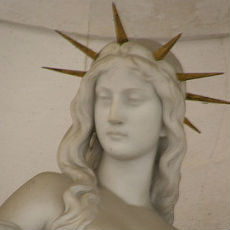Historical novels are filled with kings, queens, and uprisings, and it's a vibrant genre. I'm focusing this post on female heads of state you may not be familiar with, at least not as they've usually been depicted. If you want suggestions about smart and capable women turning the patriarchy on its ear, read on.
Andrea Camilleri, of Detective Montalbano fame, has written a witty and darkly humorous tale about a little-known head of state of Sicily in the 17th century. Eleonora de Moro becomes viceroy after her husband dies and sets out to be a just and humane ruler. Shocked that a woman would hold any power at all, the ruling council Eleonora deposes for corruption successfully plots to depose her in The Revolution of the Moon. Stunned alternately by her beauty and audacity, these men have to go to elaborate lengths to achieve their goal of defeating a wildly popular ruler in under a month.
Acclaimed author Anchee Min writes of the last real imperial ruler of China in Empress Orchid and The Last Empress. Lushly detailed, these books follow Tzu Hsi from her humble beginnings to the mother of the heir apparent to monarch as the Empress Dowager. She tries desperately to unite and strengthen China, but the country is weak in the face of Western imperialism. Full of descriptions of Chinese culture, particularly in the Forbidden City, Min's book paints a sympathetic portrait of a woman demonized by the West.
Mehrunnisa is The Twentieth Wife to the Mughal emperor Jahangir in Indu Sundrasan's novel, but she is by far the most beloved and influential. Meeting as children, the pair spend much of their time parted but reunite to become the ultimate power couple. Sundrasan immerses us in the opulent court of the Mughals and manages to give us a primer on the history of India as well.
Allison Pataki writes of Empress Elisabeth "Sisi" Hapsburg in The Accidental Empress and Sisi. Set in central Europe the turbulent period before WW I, famously beautiful Sisi accidentally steals her sister's fiancé, the Austrian-Hungarian emperor. This does not please his mother, who is constantly involved with machinations political and domestic. While they adore each other, the royal couple are often separated and have no privacy. Sisi proves valuable to the empire not only by (eventually) providing a male heir but also in her affinity for the Hungarian people and landscape. Pataki has obviously done a great deal of research on the manners and mores of the Hapsburg court, and brings to life the story of the "Fairy Queen."
Got more novels of women running things? Let us know in the comments.



Add a comment to: The Novel Lives of Women Rulers